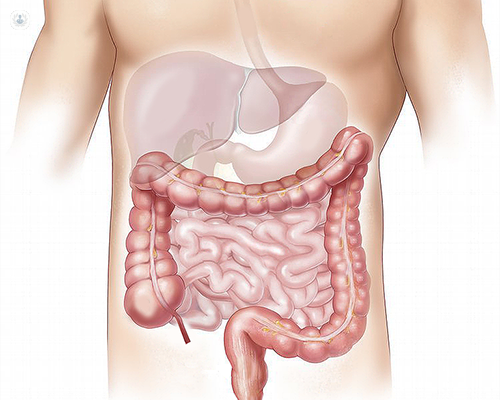Intestinal ischaemia
Mr Sudip Ray - Vascular surgery
Created on: 11-13-2012
Updated on: 03-30-2023
Edited by: Carlota Pano
What is intestinal ischaemia?
Intestinal ischaemia, also known as "dead bowel", is a condition in which the arteries of the intestine become narrowed or clogged, resulting in a poor blood supply and causing tissue damage. When this blood shortage is intense, eventually the tissue can die.
It can affect both the small intestine and the large intestine, or both at the same time. If it affects the first, it is called mesenteric ischaemia and if it is found in the colon, it is called ischaemic colitis.

What are the symptoms of intestinal ischaemia?
Symptoms of intestinal ischaemia include:
- Vomiting and nausea
- Diarrhoea
- Blood in your stool
- Fever
- Abdominal pain
- Abdominal cramps
There are certain risk factors that can increase the chances of having intestinal ischaemia, such as:
- The presence of fat deposits in one or more arteries (atherosclerosis)
- The intestinal blood pressure being too high or too low
- Heart problems (heart failure, or irregular heartbeat)
- Certain medications that cause the blood vessels to constrict or dilate (e.g. certain allergy or migraine treatments)
- Certain illegal drugs
- Blood clots
What causes intestinal ischaemia?
Intestinal ischaemia occurs when the blood supply from major arteries to the intestines either slows down or stops completely. This can happen in a number of instances, including:
- A blood clot
- Narrowing of the arteries (e.g. due to a build-up of cholesterol)
- Extremely low blood pressure
- Bowel enlargement caused by tumours
- Hernias
Can intestinal ischaemia be prevented?
The best ways to reduce the risk of intestinal ischaemia are:
- To adopt a diet rich in fruits, vegetables and reducing the amount of sugar, cholesterol and fat that you eat.
- Stopping smoking
- Doing regular physical exercise
- Maintaining a healthy weight
- Controlling other health problems, such as high cholesterol, hypertension, and diabetes.
How is intestinal ischaemia treated?
Treating intestinal ischaemia aims to restore blood flow and circulation to the digestive system. In most cases, it has to be treated surgically by removing the section of intestine that has died and connecting the remaining healthy sections.
